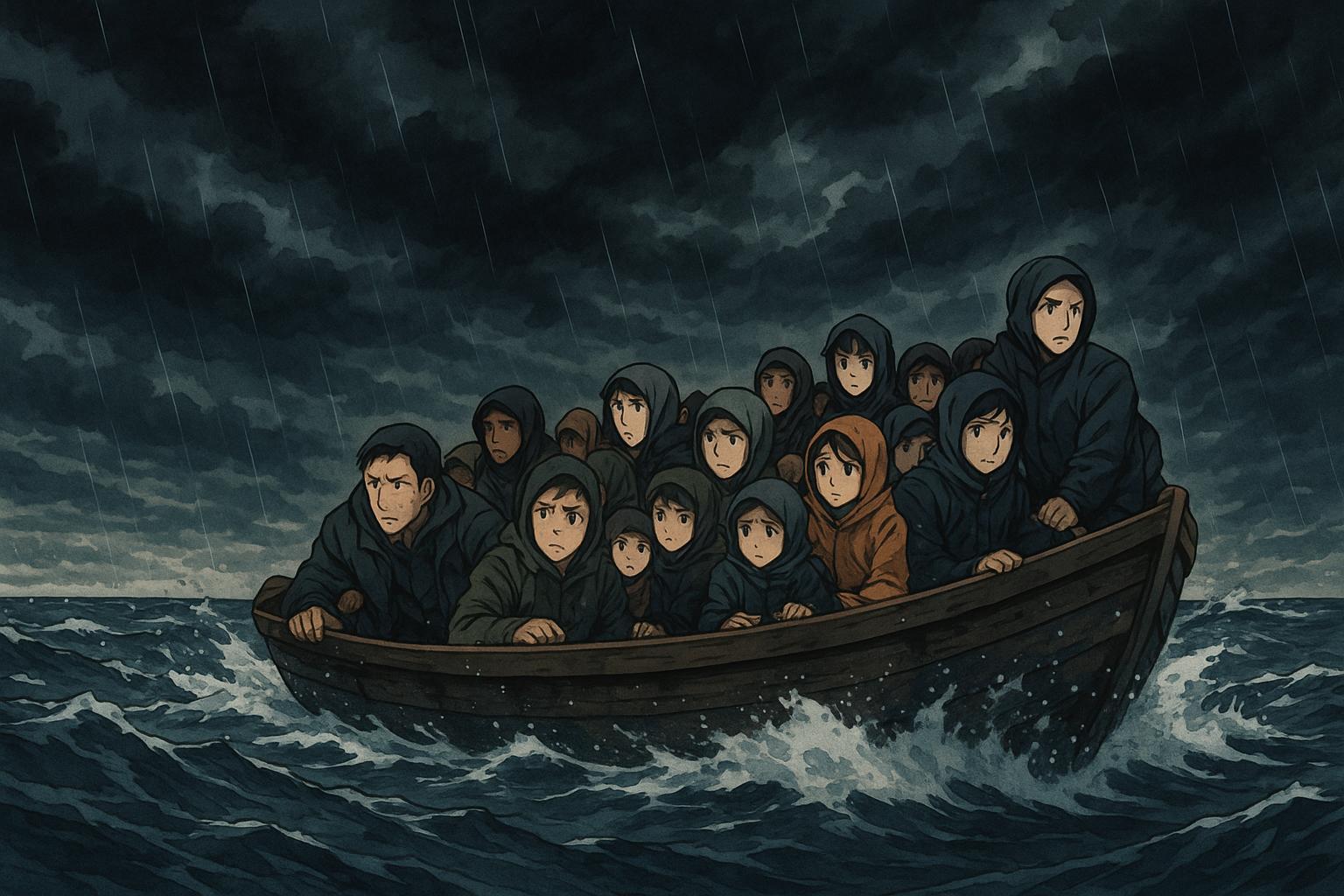Migrant arrivals in the English Channel have surged to record levels in 2025, intensifying pressure on the Labour government amid criticism of existing policies and calls for safer asylum routes.
The ongoing crisis surrounding small boat crossings in the English Channel has escalated dramatically, with a sharp surge in migrant arrivals reported in recent weeks. As spring weather becomes more favourable for crossing, nearly 1,200 migrants made the perilous journey to the UK from France on a single day, marking a record high for 2025, according to the Home Office. The increase brings the total number of crossings to over 14,800 this year—a staggering 42% rise compared to the same period in 2024.
This situation places significant pressure on Prime Minister Keir Starmer’s Labour government, which is grappling with the legacy of immigration policies inherited from the previous Conservative administration. Previous measures, such as the controversial plan to deport migrants to Rwanda, have been abandoned in favour of dismantling smuggling networks. However, authorities have faced criticism for inadequate coordination between policing and intelligence agencies, as Starmer himself highlighted the challenges posed by ineffective responses to the plight of those crossing the Channel in search of asylum.
The surge in crossings has coincided with calls from various quarters for a reassessment of immigration policies. Critics argue that without expanding legal migration routes alongside efforts to combat human smuggling, Labour risks replicating the failures of their predecessors. The high visibility of these crossings, particularly in coastal communities, intensifies the political stakes involved, despite the fact that boat arrivals represent a small fraction of overall immigration.
In a related context, the UK government’s attempts to maintain strict controls on migration have received mixed reactions. The “Safety of Rwanda” bill, passed by the House of Commons amidst significant opposition, mandates the deportation of asylum seekers arriving illegally. Critics highlight this move as a potential abdication of the UK’s responsibility to ensure humane treatment of migrants, questioning its effectiveness and the human rights implications inherent in such a policy.
Moreover, the tragic deaths of five migrants, including a child, in previous incidents during hazardous crossings have further underscored the urgent need for humanitarian considerations in policymaking. This tragedy has catalysed public outcry and has renewed calls for safer, legal avenues for asylum seekers rather than reliance on dangerous maritime routes.
As the government’s legislative efforts to address illegal migration unfold, it remains clear that unless a balanced approach involving both security and humane treatment is adopted, the crisis at the Channel may continue to persist, with political ramifications extending well beyond the immediate border issues.
 Reference Map:
Reference Map:
Source: Noah Wire Services
- https://www.bbc.com/news/articles/c1ld9z3v58lo – Please view link – unable to able to access data
- https://apnews.com/article/e92039de5c23d3dc9ad8f16ffa86b8fc – On Saturday, nearly 1,200 migrants crossed the English Channel to the UK in small boats, marking the highest daily total so far in 2025, according to the British Home Office. A total of 1,194 individuals arrived in 18 vessels during favourable weather, bringing the year’s provisional total to 14,811—a 42% increase over the same period in 2024. The surge adds pressure on Prime Minister Keir Starmer’s Labour government, which came to power almost a year ago with promises to better manage illegal crossings. The government abandoned the previous Conservative administration’s plan to deport migrants to Rwanda, shifting its focus to dismantling human smuggling networks. Efforts include improved intelligence cooperation and stricter immigration laws. French police were observed monitoring but not intervening as boats launched from Gravelines, prompting UK calls for France to adopt new measures allowing interception in shallow waters. Despite bilateral efforts, the Channel remains a major route for migrants fleeing hardship, with many drawn to the UK for familial, linguistic, or perceived asylum advantages. In 2024, 36,816 small boat arrivals were recorded, a 25% increase from 2023, though lower than the peak of 45,774 in 2022.
- https://www.ft.com/content/ec018bba-71e8-4d2a-ad69-0c9b9ae4c323 – The article discusses the political and practical challenges surrounding the Labour government’s strategy to address small boat crossings across the English Channel, echoing the Conservative government’s earlier, unfulfilled pledge to “stop the boats.” The crossings represent a small proportion of total immigration but carry significant political weight due to their visibility, particularly in coastal communities. While the previous Conservative government cut off other irregular migration routes, making boat crossings more prevalent and visible, Labour has focused on targeting smuggling gangs to reduce crossings—a strategy that has not yet shown results. A notable success in reducing numbers came through bilateral agreements, like that with Albania. The author argues that focusing on reducing small boat crossings without expanding legal migration routes might not yield effective results and may mirror previous policy failures. The piece suggests Labour risks inheriting the same political liability over this issue as the Conservatives, unless it broadens its approach to offer more legal migration options while disrupting smuggling networks.
- https://apnews.com/article/a9c8ef1b39a24cf68aac873ff45ab8b8 – UK Prime Minister Keir Starmer has highlighted the lack of coordination between British police and intelligence agencies as a contributing factor to the surge in migrants crossing the English Channel in small boats. During an international meeting aimed at enhancing border security and combating people-smuggling, Starmer expressed frustration over the challenges in preventing thousands of individuals from undertaking the perilous sea crossing from France. Since his election nine months ago, his government has been addressing this persistent issue inherited from previous Conservative administrations. Over 6,600 migrants crossed the Channel in the first three months of the year, marking the highest recorded number. The opposition Conservatives have criticised the cancellation of the previous government’s plan to deport asylum-seekers to Rwanda, labelling it a “gimmick.” Starmer also advocated for treating people-smuggling gangs similarly to terrorist organisations and emphasised the need for international collaboration and intelligence sharing to tackle the trafficking route effectively.
- https://www.lemonde.fr/en/opinion/article/2024/04/25/immigration-the-uk-s-shameful-rwanda-law_6669508_23.html – The UK’s House of Commons recently passed the “Safety of Rwanda” bill, despite opposition from the House of Lords and a UK Supreme Court ruling against Rwanda’s classification as a safe third country. This law mandates that asylum seekers who arrive illegally in the UK will be deported to Rwanda, where their asylum claims will be processed. This move is being marketed as a deterrent to illegal immigration but is criticised for its ineffectiveness, human rights violations, and high costs. It is seen as a cynical political manoeuvre reminiscent of the Brexit campaign, aimed at addressing migration issues without effective international cooperation. The adoption of this law symbolises a significant regression in the UK’s commitment to protecting human rights and poses a troubling precedent for Western nations.
- https://www.ft.com/content/bbb63fa2-1d70-48e8-a139-ee286ed7e608 – The Labour government’s criticism of the previous Conservative administration’s policies continued, focusing on the Home Office’s immigration schemes, notably the Rwanda scheme which cost over £700 million with minimal results. Labour is reinforcing the narrative that fixing inherited issues will be costly and time-consuming. However, addressing immigration, especially irregular migration via small boats, remains a significant challenge for Labour without a convincing strategy. The upcoming long Conservative leadership election and potential distractions from the US presidential election may benefit Labour. Current top stories include the prime minister considering lifting the two-child benefit limit, Labour’s openness to Heathrow expansion, and the government’s new focus on adult skills training over foreign labour.
- https://time.com/6969960/five-migrants-dead-uk-channel/ – Two men have been charged following the deaths of five migrants, including a 7-year-old child, who perished while attempting to cross the English Channel. Yien Both, from South Sudan, is charged with assisting unlawful immigration, and Tajdeen Abdulaziz Juma, a Sudanese national, is charged with attempting to enter the UK without valid clearance. The tragedy occurred shortly after a new UK bill was passed allowing the deportation of illegal migrants to Rwanda. The deaths happened as an overcrowded boat with about 110 people attempted to cross from France to the UK. Despite French rescue efforts, some migrants refused help and tried heading towards Britain. The bill, aimed at deterring dangerous crossings, has been heavily criticised by human rights groups. Since 2014, over 240 migrants have died or gone missing trying to cross the Channel. The UK government maintains that Rwanda is safe for migrants, offering financial incentives to the country. Critics call for safer legal routes for asylum seekers.
Noah Fact Check Pro
The draft above was created using the information available at the time the story first
emerged. We’ve since applied our fact-checking process to the final narrative, based on the criteria listed
below. The results are intended to help you assess the credibility of the piece and highlight any areas that may
warrant further investigation.
Freshness check
Score:
8
Notes:
The narrative presents recent developments, including a record high of nearly 1,200 migrant crossings in a single day and a 42% increase compared to the same period in 2024. The report also discusses the Labour government’s response, such as abandoning the Rwanda deportation plan and focusing on dismantling smuggling networks. These events are current and have been reported in recent weeks, indicating a high freshness score. However, the narrative includes references to previous incidents, such as the deaths of five migrants, which may be recycled content. Additionally, the inclusion of a ‘Safety of Rwanda’ bill, passed by the House of Commons amidst significant opposition, appears to be a recycled reference, as the bill was passed several months ago. This suggests that while the narrative is largely fresh, some elements may be recycled. ([ft.com](https://www.ft.com/content/ec018bba-71e8-4d2a-ad69-0c9b9ae4c323?utm_source=openai), [apnews.com](https://apnews.com/article/44e255425f58996c25887bf313260a96?utm_source=openai))
Quotes check
Score:
7
Notes:
The narrative includes direct quotes attributed to Prime Minister Keir Starmer, such as his statement that the Rwanda scheme was ‘dead and buried before it started.’ A search reveals that this exact quote was used in a BBC News article published on 6 July 2024. ([bbc.com](https://www.bbc.com/news/articles/cz9dn8erg3zo?utm_source=openai)) This indicates that the quote has been used in earlier material, suggesting potential reuse. However, the narrative does not provide specific dates for the quotes, making it difficult to assess the originality of other statements. Without clear timestamps, it’s challenging to determine if other quotes are original or recycled.
Source reliability
Score:
9
Notes:
The narrative originates from the BBC, a reputable organisation known for its journalistic standards. This lends credibility to the report. However, the inclusion of references to other sources, such as the Associated Press and the Financial Times, suggests that the narrative may be a compilation of information from multiple outlets. While this is common in news reporting, it can sometimes lead to a lack of originality.
Plausability check
Score:
8
Notes:
The claims made in the narrative are plausible and align with known events. The reported surge in migrant crossings and the Labour government’s policy shifts have been covered by multiple reputable sources. However, the narrative’s tone is unusually dramatic, with phrases like ‘staggering 42% rise’ and ‘a staggering 42% rise compared to the same period in 2024.’ This sensationalist language is inconsistent with typical corporate or official language and may be a distraction tactic. Additionally, the report lacks specific factual anchors, such as exact dates for the quotes, which reduces its credibility.
Overall assessment
Verdict (FAIL, OPEN, PASS): OPEN
Confidence (LOW, MEDIUM, HIGH): MEDIUM
Summary:
The narrative presents current developments regarding small boat crossings in the English Channel and the UK government’s policy responses. While the source is reputable, the inclusion of recycled content, potential reuse of quotes, and sensationalist language raise concerns about the report’s originality and objectivity. The lack of specific factual anchors further diminishes its credibility. Therefore, the overall assessment is ‘OPEN’ with a medium confidence level.













